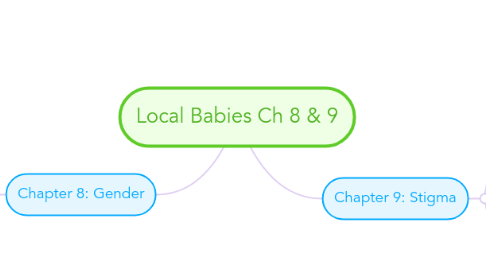
1. Chapter 8: Gender
1.1. The Man Who Replaced His Wife
1.1.1. Marriages fail because inability to become pregnant
1.1.1.1. Moustafa & Hala
1.1.2. The struggle of healthy females having to go through reproductive therapy when the male is infertile
1.1.2.1. Moustafa & Shahira
1.1.3. Fear of delivering test tube baby twins
1.2. Infertility: His and Hers
1.2.1. Are children more important than wedding vows?
1.2.2. Infertility is a gender and marriage threatening condition
1.2.2.1. Couple is not "well defined" without children in marriage
1.2.3. Feminist scholars take on IVF and reproductive technologies and complications
1.3. Femininities, Masculinities and Child Desire
1.3.1. In Egypt no educated individual will say they do not desire children
1.3.1.1. Children come highly over a women's career
1.3.2. In Egypt, high emphasis on God's wishes
1.3.3. High element of patriarchy in Egyptian culture has a impact on infertility and patriarchy
1.3.3.1. Men can be viewed as weak or ineffective without children
1.3.4. Egyptian masculinity in relation to dominance, and subordination.
1.3.4.1. Middle Eastern research
1.3.5. Women will protect their husbands by lying about the infertility
1.3.5.1. In Egypt it is more embarrassing for the man to be infertile than the women
1.4. Conjugal Connectivity
1.4.1. Marriage is a highly coveted act for egyptians
1.4.1.1. "Protection" for both man and women
1.4.2. Marriages are often arranged or semi arranged
1.4.2.1. Love is expected to emerge after marriage
1.4.2.2. Thought to find love through childbirth
1.4.3. A high desire to be conjugally connected to ones married partner
1.4.4. Studies done to show couples staying together through infertility
1.5. Marriage and Divorce in the Age of ICSI
1.5.1. Male infertility can shift balance of power in marriages
1.5.1.1. Wife can choose to stay or divorce
1.5.2. ICSI if successful has the ability to re-masculinize men
1.5.3. Issues with middle age women and ICSI
1.5.4. Doctors feel responsible for the break up of couples with "bad news"
1.5.5. Moral components
1.5.5.1. EX: If a couple has been together for 15 years but one is deemed infertile, shall the other remain in the marriage
1.5.5.2. Age factors
1.5.5.3. Co-wives
2. Chapter 9: Stigma
2.1. The women with the Secrets
2.1.1. Malpractice of Maisa and Ahmed
2.1.1.1. Both had issues with procedures
2.1.1.2. Struggle with fail of first pregnancy
2.1.2. Stigma and secrecy ongoing with ISCI
2.2. The "Top Secret" Stigma
2.2.1. Infertility is the biggest secret many individuals struggle with
2.2.1.1. participants in studies describe themselves as, garbage, loser, useless and so on.
2.2.2. Felt vs enacted stigma.
2.2.3. Although men feel the self consciousness with infertility, women are often the only ones discriminated against.
2.2.3.1. wives often take the blame even when the male is the infertile one.
2.2.4. Women to women discrimination about infertility
2.2.5. Infertile Egyptian Elites
2.2.5.1. Ability to close off invasions of privacy
2.2.6. Egyptian vs Western Stigma with ICSI
2.3. Dilemmas of Disclosure
2.3.1. To tell or not to tell?
2.3.2. Social and Moral issues with Donor Insemination
2.3.2.1. In Egypt all forms of DI are prohibited
2.3.3. Fear to tell children they were test tube babes
2.3.4. Many individuals felt they should tell their children about being test tube babies to further increase awareness of IVF and ICSI
2.4. The Stigma of Support
2.4.1. Lack of support
2.4.1.1. emotional isolation
2.4.2. In the West it is not uncommon to find infertility support groups
2.4.2.1. Professional and Patient run
2.4.2.2. National associations designed to empower infertile people
2.4.3. Lack of Support in Egypt
2.4.3.1. Fear of exposure
2.4.3.2. Fell of worsening the emotional pain rather than helping it
2.4.3.3. Not Egyptian tradition
2.4.3.4. Hotline idea by Dr Yehia
2.4.4. Need of a psychological service with infertility treatments
2.4.4.1. Many Egyptians associate psychology with mental health.
2.4.4.1.1. They don't see a need
